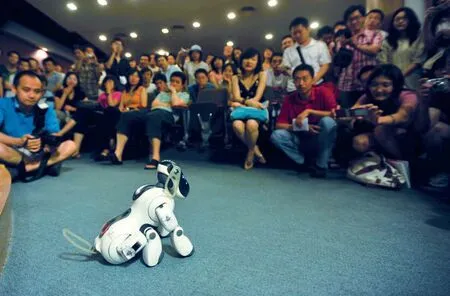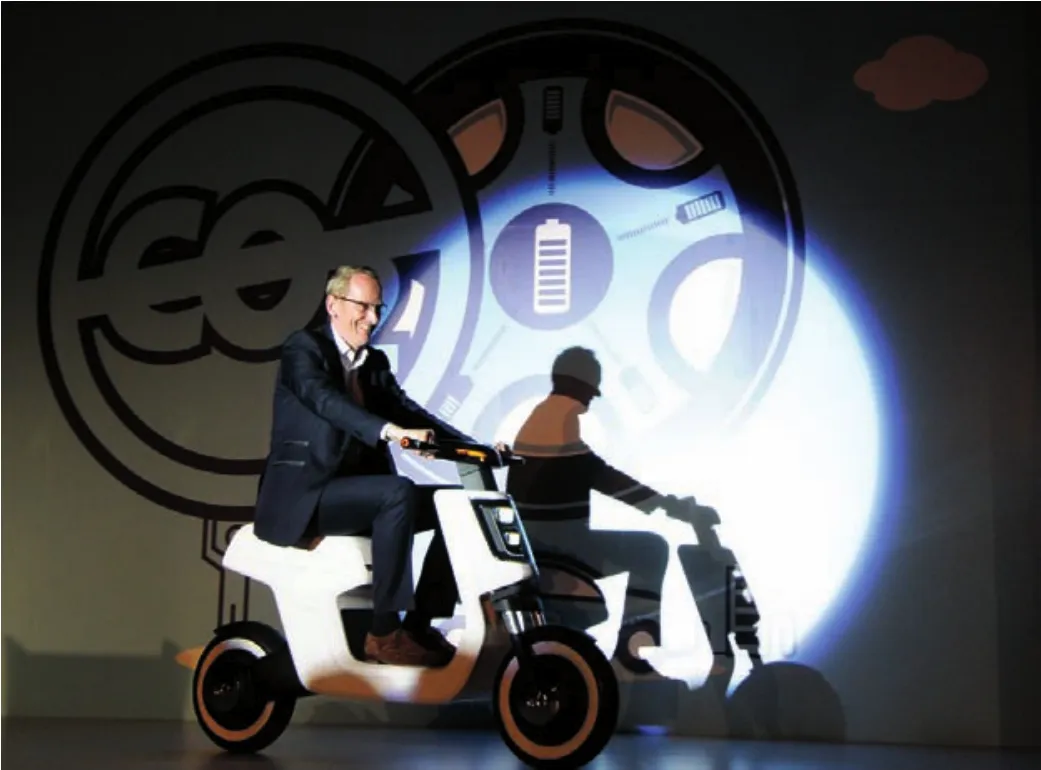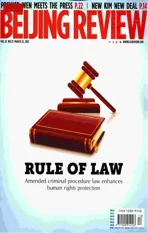Cool Nerds
2012-10-16TheScienceSquirrelsClubmakesitsmarkonChinafastfoodgenerationByZhengYang
The Science Squirrels Club makes its mark on China’s fast food generation By Zheng Yang
Cool Nerds
The Science Squirrels Club makes its mark on China’s fast food generation By Zheng Yang

MAN’S BEST ROBOT FRIEND:Science enthusiasts watch an intelligent robot dog show held by the Science Squirrels Club
Can people actually sleep with their eyes open? What causes red dyes to run in the wash? Why do headphone wires get twisted inside jacket pockets?
While the answers to these great, life mysteries can easily be ascertained from friends or family, for the most scienti fi c solutions it’s best to ask the Squirrels.
The Science Squirrels Club, a Chinese Internet community founded by science enthusiasts, has attracted a loyal following of young people from across China in the past four years, triggering a kind of science renaissance in China. Now, the Squirrels, with their stylish take on science and their scienti fi c approach to problem solving and learning, are watching a growing number of youth embrace science.
Cracked nuts
The Science Squirrels Club gets its name from a metaphor. Science, explained the club members, is like a nut: nutritious inside but surrounded by a shell that is hard to crack.And like actual squirrels, the Squirrels are tackling the challenge of cracking those hard scienti fi c “nuts.”
Originally a science blog, the club was named one of the “Best Global Chinese Blogs” in 2008. The award described them as exploring “everything from roses to spaceships, covering almost all themes in science.”The win was an af fi rmation of their methods:Topics are kept interesting but also academically correct. Since then, the blog has expanded into a full-blown community. No other scienti fi c group in China has yet to garner this amount of attention from a generation raised on fast food and pop music.
“Fun” is what explains the Squirrels’ success. Ideas discussed on the site range from the universal to the trivial, sometimes odd,but always eye-catching. They focus on relating science to daily life, like how to date with the help of statistics. Popular phrases replace confusing jargon to explain once-inscrutable scienti fi c theory.
Still, science remains a serious endeavor.In their essays the Squirrels talk about life,love and politics, but always from a scienti fi c perspective. Each piece goes through a process of scrutiny, critique and revision before it is published online.
“Precision is always at the top of our list,”says You You, the club’s chief editor. “We add references at the end of essays. Normally,references only appear in research papers, but we insist on doing it.”
The Squirrels also move beyond the virtual world, into the real world. They offer activity packages like fi lm parties where peo-ple gather to watch a scienti fi c documentary,followed by a group discussion. Questions are answered and knowledge shared—and above all enjoyed. Other packages involve laboratory experiments and visits to science centers.The activities attract thousands; applicant numbers are usually several times the maximum that the group can accommodate.
Recently, the club launched a science reporting training program. The training courses are for science journalists, but teachers will also be invited to attend future program.
“We try to get wide coverage with our activities,” says Tian Chen, a senior Squirrel responsible for club operations. “It’s hard to make science popular, so we try to add some fad aspects. Meanwhile, we want to integrate science into the media and education in order to get more people involved.”
Squirrel beginnings
Ji Shisan, Science Squirrels’ founder, graduated with a Ph.D in neurobiology in 2007, a task that took 11 years to complete. But, a longtime lover of writing, he moved away from his future career as a scientist and began writing science columns for different media outlets.
“Scientific research requires one to dive into a certain subject in depth, while science-related communication involves wide knowledge. I think I like that more,” Ji says of his career move.
When Ji decided to set up the Science Squirrels Club, his idea was simple—“Authors of science articles work separately,and I wanted to build a platform that would connect them together.” Ji was not the only person trying to reach a tricky balance between rigorous scientific research and mainstream accessibility. When he started sending out author requests in 2008, the responses flooded in. Since then, the group has grown at an amazing speed. “Sometimes I feel as if those people are hiding in a big house,” Ji writes in a blog post, explaining the phenomenon. “They surface from different corners when I call them to dinner.”
Juzi was one of the club’s fi rst members to join. At the time, she was working toward a Ph.D in cytology in the United States. She joined the group to kill time between courses,but found herself obsessed with the Squirrels’community. After she graduated, the scientistto-be bought a plane ticket to Beijing, leaving behind a decade of life lived in a lab. The day after she arrived, she walked straight into the club’s headquarters and became a full-time employee.

THE E-FUTURE:Karl-Thomas Neumann,CEO of Volkswagen China, rides an E-Scooter at a science forum held on July 16,2011, by the Science Squirrels Club and Guokr.com
“The group gives me a sense of belonging,” she says. “It’s a totally different feeling from what I get through doing research. You can always get feedback. You know that you have readers, and they like what you write.”
Presently, the Science Squirrels Club has over 100 members in several countries, including China, the United States and Britain. Most are educated science majors. The Squirrels also attract literature majors, though, and high school students are active participants.
“There is a misunderstanding that only those majoring in science can join us,” says You, the club’s chief editor. “In fact, there are many Squirrels majoring in Chinese.”You is adamant about the club’s accessibility. “Science literacy has nothing to do with your major. It can be acquired through selfeducation and extensive reading.”
Although the Squirrels differ in age and major, they share many passions. They all love writing, communicating and sharing.They talk in an organized and rigorous way—but insist on referring to each other with funny screen names.
“The best part of joining the club has been getting to know a lot of funny guys,” says You. “They view the world in a unique way.They have widened my horizons and changed my life.”
Expanding
Although the Science Squirrels Club has kept Making Science Popular as its slogan, its founder Ji has other plans.
“Making Science Popular needs a context,” he says. “To fulfill the goal, we need to get more social resources involved.” At the end of 2010, Ji launched a new website,Guokr.com. Unlike the club, Guokr is a commercial enterprise.
“We need different organizational structures to serve different goals,” Ji explains.“The Science Squirrels Club is an association of science writers, focusing on their personal growth. Its appropriate form is a non-profit organization.”
“Guokr.com is a science and technology community that is devoted to building connections between regular people. I hope that it can exert a wider in fl uence,” he says.
A big problem in China, says Ji, is the gulf that exists between science and culture, and also between people working in the two fi elds.He insists that science and technology should be more embraced in the mainstream culture.
“We used to believe science and technology could only impact our daily lives, but now I hope it can also in fl uence our cultural selves and then the way we think,” he explains. “Science is a way to see the world. In the past, people tended to view the world only through the lens of the humanities. In the future, I hope they can realize that there are also scienti fi c lens.”
Now the CEO of Guokr.com, Ji has his hands full every day. But giving public lectures for the club is still on his schedule. After all, what drives him is his interest in science.
“Originally, I wanted to be a scientist.And then it turned into wanting to be a good journalist or science writer. My ideas are always changing,” Ji says with a laugh.“It’s hard to say what I will want to do next year.”
